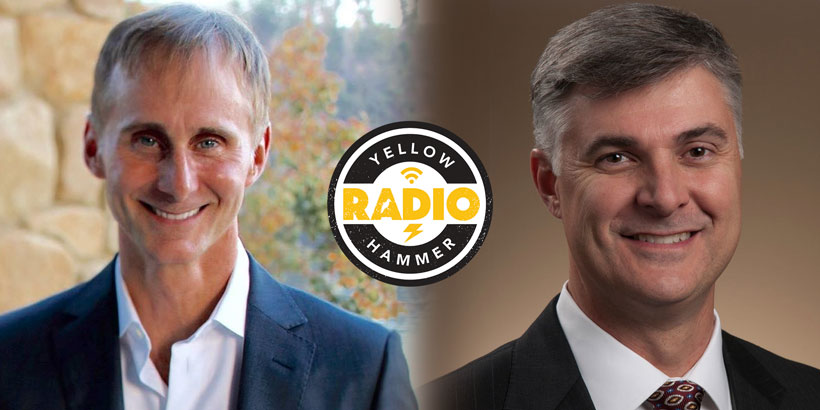Birmingham, Alabama-based financial guru Jeff Roberts, who was recently named one of the top private wealth advisors in the nation by Barron’s®, came on Yellowhammer Radio Tuesday to lay out the facts so people can decide for themselves.
The full conversation with Mr. Roberts can be heard on the Yellowhammer Radio podcast or in the video above, and a lightly edited transcript of his interview with Yellowhammer’s Cliff Sims can be read below.
Subscribe to the Yellowhammer Radio Podcast on iTunes. Learn more about Jeff Roberts’ private wealth advisory practice at JeffRobertsAndAssociates.com.
Scott:
So many people, so few people want to do their job the rest of their lives. Everybody wants to one day retire and do some other things and I’m hoping you’ll share with us what we need to know when it comes to planning retirement because I’m one of those people, Jeff. I what little money I had serving in the state legislature regardless of what people think you don’t get rich there. If you’re trying to do the right thing, you go broke. What should we know about retirement planning?
Jeff:
Well first, we should understand that there are two phases of retirement planning in general. There’s the accumulation phase and a distribution phase. And obviously the accumulation phase involves planning for retirement before you actually retire. When you are accumulating savings. The distribution phase occurs during retirement when often times people are distributing their savings to cover retirement living expenses. Many people think that retirement planning is only for people who have not yet retired and that’s just not true. Getting to retirement is just half of the planning. The rest occurs during retirement and there’s a tremendous amount of work that must occur once in retirement.
Scott:
Jeff, you know I never really thought about that but I guess the issue is that people spend their money too fast. Or they realize that ‘I may live ten years longer than I thought.’ Is that the sort of things you’re talking about?
Jeff:
That’s exactly right. Just knowing how far your retirement can last you.
Scott:
Jeff, I know this is a big topic and we can’t cover it in one session. And like I said, you’re talking to me as much as you’re talking to all of the listeners out there. Can we continue to do retirement planning stuff in our upcoming Wednesday talk so that people know and can tell their friends and listen to us here on Yellowhammer and listen to Jeff Roberts talk about retirement planning for the next few weeks?
Jeff:
Absolutely. We’ve got plenty to discuss on this topic. I think the next two to three Wednesdays we can do that and we can start today by tackling some of the accumulation phase issues, today.
Scott:
When you talk about the accumulation phase the part where I’m supposed to be saving my money and putting it in the right places, what are you telling people about that?
Jeff:
Generally when it comes to planning for retirement most of us only get one shot at this. There are only so many years in which you can plan. It is likely that your job at some point is going to stop. Or your ability to do your job may stop. Or your desire to do your job may stop and that’s most commonly what we see in our business. Clients desires to do their job just come to an end at some point. For some of us we are blessed to have jobs that we may do for forever. But everyone that I advise that is in the accumulation phase wants to reach a point where work is optional and retirement is affordable. They want to know they don’t have to work. But you have to get serious right now because time is our biggest ally.
Scott:
Absolutely, I have noticed through a lot of people over the years when they go through the accumulation phase, working with a guy like you, Jeff, and they realized that they don’t have to work anymore. All of a sudden their job starts to be much more enjoyable because they know at any moment they can say, ‘ Hey, look I’m out of here.” And that would be a great place to be. How do I get there? How do we get there?
Jeff:
For clients that are serious about planning for retirement we engage in a financial planning relationship where we define the goal, what is retirement to them? What does it look like? When does it occur? Take an inventory of where you are now and then do the math. I’m going to over simplify this for the sake of time today but we have to drill down on what each client is trying to accomplish. Because everybody’s retirement may look different, may feel different, sound different, plan different. We have to answer a few questions, actually several questions. And three important ones are, when do you reasonably want to retire? Of course everybody says they want to retire tomorrow. It’s amazing how quickly people say that. Second thing is for example, how much income do you need in retirement to maintain the lifestyle that you desire? And then a third good question is, how long might you live? Because life expectancy varies in families and quite frankly our planning would be tremendously easy if we knew the date of everyone’s death. That would make it a lot easier. We don’t so we have to make some assumptions there and your family and your history makes a little bit of difference there too. When we take an inventory of everything that you have done today for retirement. And then we have to look at how much you’ve saved for retirement. How much you’re going to be saving for retirement moving forward and are there any company benefits that need to be taken into consideration? Are there any expected inheritances or lump sums that may come from the sale of a business? Once we have asked all of the questions and we’ve made all of the assumptions, collected all of the data, then we start calculating all of the financial projections to determine if you are on track or not on track. And then we simply just execute a plan that tightens up any gaps that you have.
Scott:
So, you make it sound easy and I’m sure when I come to you, Jeff, you’re going to say ‘No Scott, you can not plan on winning the lottery. Especially if you don’t play the lottery’. You make it sound easy to do, is it really easy?
Jeff:
I’d like to think that if you work with us then it definitely is. In the last twenty four years I’ve written thousands of financial plans but in fairness planning for retirement is simple but not easy. Most of the important things in life are that way. Incredibly simple but not easy.
Scott:
I know one of them already. I can’t plan on winning the lottery so what are some of the other common mistakes that those in the accumulation phase make?
Jeff:
Oh gosh, there’s probably a dozen that come off the top of my head. I’ll ramble some off quickly for listeners to hear. Number one, it’s hard to be objective with your own money and I recommend working with a financial advisor who specializes in ongoing retirement advise. You typically need a coach, we all do. And someone that can hold you accountable to your goals, probably number one. And these are all in random order. Two, people not getting serious about retirement planning early enough. They’ve got so many things going on in life with kids, family and soccer and everything they’ve got to do but recognizing that you only have so many years to plan for retirement. The sooner you do it right the better. As I said earlier, you only have one shot at this and there’s only so many years to accumulate so we’ve got to get serious right now. Probably a third most common mistake is people carrying too much debt before retirement or trying to retire with too much debt still on the books. That often causes many problems in retirement. Number four would be people often fail to monitor their progress towards retirement. So they do something and that’s the last they do for awhile and don’t think anymore about retirement. They spend more time planning their family vacation than they do their long term financial objectives for retirement. So we prefer to engage retirement with clients at least doing annual projections. Number five would probably be seeing people maintaining multiple retirement plans from former employers. Where they exchanged jobs two or three times and they’ve got these retirement plans laying in different spots and most people don’t manage one retirement plan very well much less two or three. So addressing that is important. And people not saving enough towards retirement very simply. Most people save about the same as what their company is matching so 4% or 5% or 6% say into their 401k plan. And we generally tell clients that they need to be saving a minimum of 10% of everything they make towards retirement. Ideally 15%. People also don’t regularly increase their level of retirement savings. So it’s hard to start saving 15% straight off the bat towards retirement so you have to start at a lower level that’s comfortable and bump it up regularly every six months or a year when you get a pay raise. Not having the right amount of long term growth exposure in someones portfolio is also a gap that we see. And maybe the last pitfall or roadblock is going through the process of determining what you need to do relative to retirement but then not actually taking action and tracking yourself.
Scott:
See that would be where I am and where a lot of people I know are. We have not started that process and having someone like yourself say, ‘Okay these are the things that you need to do to make that process happen.’ And on the other end of the spectrum, are there some common pitfalls that people miss when they’re trying to see where their goals are?
Jeff:
No doubt. Understanding how to calculate your income needs at retirement is typically a big pitfall. For example, you sometimes hear the rule of thumb that says, ‘In retirement you need to have about 80% of what you earn just before you retire.’ That can be way off base and very misleading. I’ve seen clients retire with only 40% of what they earned before they retired and be very comfortable. I’ve seen other clients retire with 120% of what they had before they retired and that aligned with their goals. So we walk clients individually through an exercise where we take their base income that they live off of and subtract out things like taxes and the other expenses that they currently have today but won’t have at retirement. So imagine your base income back out a mortgage because you hope that’s gone, back out children because you hope your kids are gone when you retire, back out car payments, back out retirement savings contributions, back out your FICA tax which is 7.5% or so of everything that you earn. So then that gives us a number that is actually the standard of living that you go by and live by today. That’s what you actually have to spend and live off of. Then we add to that number what expenses you may have in retirement that you don’t have today like travel or grandchildren or maybe medical expenses. And then we arrive at a number in today’s dollars that indicates what your retirement expenses would need to be if you retired right now. So that’s the pitfalls. Helping people go through that process. That’s why we think engaging in an advisor is key. Another quick one is business owners. It’s tough fore retirement planning, it can make things cloudy because many small business owners have a huge amount of their wealth tied up in their business and it’s hard for them to determine what the business is actually worth and even harder to find somebody that might be willing to take it over or buy it. So for small business owners succession planning is a critical part of our work. And maybe the last pitfall, it’s very very common is people fail to adequately for long term illness or injury during retirement and ideally long term care planning should be addressed in the accumulation phase because it can get way expense during retirement.
Scott:
Do you have anything that you’d like to say to wrap it up here?
Jeff:
Just a couple things. Let’s definitely do maybe the next one or two sessions on Wednesday about retirement to pick this up again and continue. And talk also about the distribution phase at retirement. But I want to make sure people hear me clearly, a good retirement does not just happen. It has to be planned. If you don’t feel confident that you are on track give us a call. Or, this is a neat idea, go JeffRobertsand Associates.com, our website and on the very first page just below my picture you can take our three minute confident retirement check to find out how confident you feel about your financial future and how your retirement confidence compares to others.













